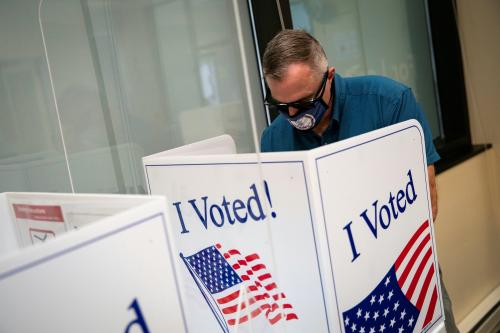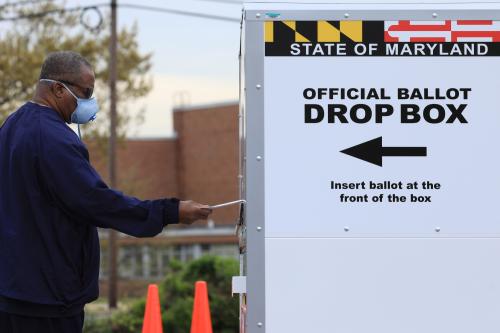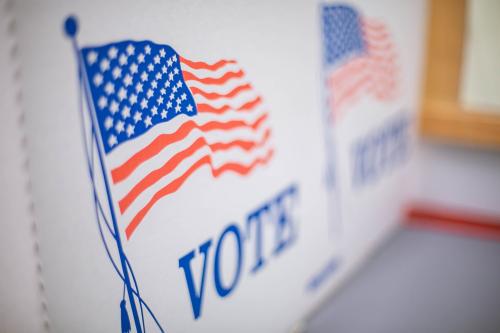As more and more states move to mail-in ballots as the safest way to vote during a pandemic, Trump has mobilized the Republican Party to fight them and the Republican National Committee filed suit in California last week. He has made two accusations about mail-in ballots; the first is that they favor Democrats and the second is that they make it easier to cheat. Neither one is supported by the facts. There is no evidence to suggest a systematic bias towards one party or another from mail-in ballots. Nor is there any evidence that there is widespread fraud in the use of mail-in ballots.
This is not the first time that President Trump has been obsessed with vote fraud. After he won the 2016 election he declared, without any proof, that millions of undocumented immigrants voted illegally and that without them he would have won the popular vote as well as the electoral college vote.
In addition to winning the Electoral College in a landslide, I won the popular vote if you deduct the millions of people who voted illegally
— Donald J. Trump (@realDonaldTrump) November 27, 2016
He was so enamored of this explanation for why he lost the popular vote that he even convened a task force to look at voter fraud—a task force that found so little fraud it was disbanded the next year without even issuing a report.
The Heritage Foundation, a right-wing think tank, has been studying voter fraud for years in order to provide support for more restrictive voting laws such as voter ID. The most recent report has an attention-grabbing headline: “Database Swells to 1,285 Proven Cases of Voter Fraud in America.” They admit that the report isn’t comprehensive because it doesn’t capture cases that aren’t investigated or prosecuted. Yet, on the basis of that report they argue that there is serious voter fraud in America.
Heritage makes their full database available, so we were able to look into the cases of voter fraud that they claim represent rampant illegal activity. We began with the five states that have already used universal vote-by-mail systems and thus have one or more elections under their belt. Then we looked at the way Heritage categorizes cases of voter fraud. Most of their categories, such as false voter registration or ballot petition fraud, can occur regardless of whether a state has implemented vote-by-mail. However, we might expect that duplicate voting and fraudulent use of an absentee ballot—both of which typically involve one person voting their own ballot and someone else’s ballot as well—would be easier in vote-by-mail states than in states where the voter would have to physically travel between precincts or from one county to another.
The following table lists the five states that have been using vote-by-mail prior to 2018. We looked at their fraud cases from the Heritage sample to see how many were of a type that vote-by-mail systems might be more vulnerable to and how many votes were affected. Our conclusion, from Heritage’s data: There is surprisingly little voter fraud and not nearly enough to justify blocking vote-by-mail systems in a pandemic.
| Vote-by-mail state | Total cases of voter fraud in Heritage sample | Total cases of duplicate voting or absentee ballot fraud In Heritage sample | Number of fraudulent votes attempted by mail | Time period for collection of fraud cases | Year vote-by-mail enacted | Number of general election votes cast over the same time period |
| Colorado | 14 | 8 | 8 | 2005–2018 | 2013 | 15,955,704 |
| Hawaii | 2 | 0 | 0 | 1982– 2016 | 2019 | 6,908,429 |
| Oregon | 15 | 9 | 14 | 2000–2019 | 1998 | 15,476,519 |
| Utah | 1 | 0 | 0 | 2008 | 2013 | 971,185 |
| Washington | 12 | 7 | 7 | 2004–2010 | 2005 | 10,605,749 |
Sources: The Heritage Foundation; United States Elections Project; Hawaii Secretary of State
The above chart refutes the contention that mail-in ballot systems are rife with fraud in several ways. First, note the small number of voter fraud cases overall. Next, note that a subset of those cases involve types of fraud to which mail-in ballot systems would be especially susceptible. Next, look at the time periods covered by these data. In Oregon, the first state to adopt a universal vote-by-mail system, the Heritage researchers had to cover a period of 19 years in order to find 15 cases of voter fraud! Less than one case a year hardly qualifies as rampant voter fraud.
But perhaps the most revealing column is the one listing the number of fraudulent votes attempted by mail. Republicans would have you believe that vote fraud is widespread enough to affect elections. But the fraud uncovered by the Heritage study is inconsequential. What has been uncovered in these five vote-by-mail states is on the individual level and not on an organized level. For instance, Janice Waters of Marysville, Washington, was found guilty of voting a ballot for her son who was a convicted felon and thus not eligible to vote. Jane Kay Balogh, also from Washington, was convicted of registering her dog Duncan to vote at her address and filling out an absentee ballot for him. Waters was sentenced to jail time, later converted to community service; Balogh got a deferred sentence plus community service and had to pay court costs. In Oregon, Terri Louise Kobialka was convicted of filling out a ballot mailed to her apartment in the name of a former roommate. She was fined $500 and ordered to do 120 hours of community service.
Of course, there are instances of large-scale vote fraud. The most famous one occurred in the 9th congressional district of North Carolina in the 2018 election cycle where political operatives for the Republican congressional candidate illegally collected absentee ballots. They were caught and convicted. The election was overturned and a new one held.
Any case of voter fraud is serious, and the guilty parties should be caught and prosecuted. But the evidence presented by the Heritage database does not make the case that voter fraud is a major problem in America, nor does it make the case that mail-in ballot systems are riddled with fraudulent activity. If that’s all the opponents of vote-by-mail can come up with, their case will not persuade the millions of voters who would like to cast their ballots safely and securely in November.
Note: This post was updated on 6/11/2020. The original version incorrectly stated that Dan McCready won in NC-09.








Commentary
Low rates of fraud in vote-by-mail states show the benefits outweigh the risks
June 2, 2020